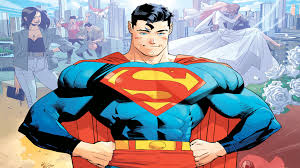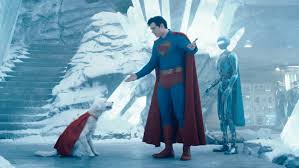Superman – The Cinematic Journey of the World’s First Superhero
Introduction
When the name Superman is mentioned, it evokes images of strength, hope, and heroism. Draped in a cape of red, with the iconic “S” symbol shining on his chest, Superman is not merely a comic book character — he is a cultural icon whose presence transcends generations. From his humble origins in comic book pages during the late 1930s to becoming one of the most recognizable figures in cinema, Superman has remained the ultimate symbol of justice, resilience, and the belief that goodness will always triumph.

Over the decades, countless superheroes have entered popular culture, but Superman continues to stand at the forefront. His movies have defined eras, inspired millions, and shaped the way superhero cinema is perceived today. This blog post will provide an in-depth, spoiler-free journey into Superman’s cinematic history, exploring his themes, impact, performances, and the reasons why he remains the definitive superhero of our time.
The Origin of Superman on the Big Screen
Superman’s story began in 1938, when he appeared in Action Comics #1. His leap to cinema wasn’t far behind, with animated shorts in the 1940s and live-action portrayals soon after. But it was the 1978 release of Superman: The Movie that changed everything.
Richard Donner’s vision turned Superman into a blockbuster phenomenon. Played by Christopher Reeve, Superman was no longer just a figure in comic panels but a living, breathing hero who inspired awe in audiences worldwide. The tagline — “You’ll believe a man can fly” — was not just marketing but a promise that cinema had entered a new age.

Since then, Superman has been reimagined through multiple film series, actors, and storytelling approaches. From Christopher Reeve to Henry Cavill, each interpretation has brought something new to the character while preserving his timeless qualities of courage, compassion, and truth.
The Themes That Define Superman Movies
Superman films are not simply about action or special effects. They are rooted in powerful, universal themes that continue to resonate across cultures.
1. Hope Above All
The “S” on Superman’s chest is often described as a symbol of hope. His films consistently portray him as a figure who brings light to the darkest situations. Regardless of the challenges — be they villains, disasters, or moral dilemmas — Superman embodies the belief that hope can prevail.

2. The Struggle of Identity
Superman’s dual identity as Clark Kent and Kal-El is central to his story. His films often explore the tension between being human and being something more. Clark’s grounded, humble lifestyle contrasts with Superman’s extraordinary powers, creating a powerful narrative about belonging, responsibility, and self-acceptance.
3. Morality and Responsibility
Unlike darker antiheroes, Superman represents a clear moral compass. His choices remind us that immense power must be guided by responsibility. His films emphasize that true strength is not in domination but in protecting the vulnerable.
4. The American Dream and Global Symbolism
While Superman was born out of American comic books, his values extend far beyond borders. His movies present him as a symbol of the universal human desire for justice, kindness, and fairness. He is not just an American hero; he is a global one.

5. Humanity in a Godlike Being
Superman’s films constantly remind us that despite his alien origins, what makes him heroic is not his powers but his humanity. His compassion, love, and empathy define him far more than flight or super strength ever could.
Iconic Superman Performances
Christopher Reeve (1978–1987)
For many, Christopher Reeve remains the definitive Superman. His charisma, charm, and ability to portray both Clark Kent’s clumsy humanity and Superman’s noble confidence made him unforgettable. Reeve set the gold standard, creating an image of Superman that would endure for decades.
Brandon Routh (Superman Returns, 2006)
Brandon Routh brought Superman back to the big screen after nearly two decades. His portrayal carried the legacy of Christopher Reeve, offering a nostalgic yet heartfelt take on the character. Although the film divided critics, Routh’s sincerity left a lasting impression.
Henry Cavill (2013–2023)
Henry Cavill redefined Superman for a new era. In films like Man of Steel and Batman v Superman: Dawn of Justice, he embodied a more conflicted and modern version of the hero. His physical presence, combined with moments of vulnerability, allowed audiences to see Superman in a deeper, more human light.

Visual Brilliance and Cinematic Style
Superman films have consistently pushed the boundaries of visual storytelling.
1978 Superman: Groundbreaking visual effects convinced audiences for the first time that flight could look real.
Superman Returns (2006): Used cutting-edge CGI for grand action sequences and stunning rescues.
Man of Steel (2013): Brought modern, gritty realism to Superman, with breathtaking visuals that made Krypton and Earth come alive.
The consistent evolution of visuals in Superman films mirrors cinema’s own progress, showing how technology and storytelling go hand in hand.
The Music That Defines Superman
No discussion of Superman cinema is complete without mentioning its music.
John Williams’ Iconic Theme (1978): Perhaps one of the most recognizable scores in film history, Williams’ triumphant Superman theme became synonymous with heroism itself.
Hans Zimmer’s Score (2013): For Man of Steel, Zimmer crafted a bold, emotional soundscape that emphasized both Superman’s alien origins and his deeply human struggles.
The music of Superman films ensures that audiences not only see the hero on screen but feel his presence through sound.

Reception and Cultural Impact
Superman’s cinematic presence has always been larger than life. The original films inspired countless fans and shaped the superhero genre. Later adaptations reignited debates about how Superman should be portrayed: light-hearted and hopeful, or modern and conflicted.
Regardless of style, each Superman film has kept the character alive in popular consciousness. Superman’s symbol — the “S” shield — is globally recognized, often worn not just by fans of comics but by people who view it as a universal emblem of strength and hope.
Superman as a Cultural Icon
Superman movies go beyond entertainment. They are part of cultural identity.
A Symbol of Hope in Times of Crisis – During difficult times, Superman films have offered reassurance that good will prevail.
Inspiration for Generations – From children wearing capes to adults finding strength in his ideals, Superman inspires across all ages.
Defining the Superhero Genre – Without Superman, the modern superhero movie landscape may not exist. He paved the way for everything that followed.
Lessons We Can Learn from Superman
Use Strength for Good – True power lies in protection, not domination.
Embrace Duality – Our challenges and contradictions make us human, just as Clark Kent balances his identities.
Hope Never Fails – In every situation, hope lights the path forward.
Responsibility Comes with Power – Every action has consequences, and true greatness means bearing them with courage.
Humanity is the Greatest Superpower – Empathy, love, and kindness define heroism more than abilities ever could.
Why Superman Still Matters Today
In an era where superheroes often tread darker paths, Superman remains timeless. His films remind us that optimism, compassion, and integrity are not outdated values. They are the very ideals the world needs most.
The cinematic versions of Superman may differ, but the essence remains unchanged: he is the beacon of hope, the protector of humanity, and the reminder that we all have the capacity to be heroes in our own ways.
Conclusion
Superman’s journey from comic books to cinema is not just a story about a superhero but about the enduring power of hope. His films have shaped the way we perceive heroes, influenced countless stories, and inspired generations of audiences.
Whether soaring through the skies in 1978’s groundbreaking classic, returning in 2006’s heartfelt revival, or confronting modern dilemmas in Man of Steel and beyond, Superman continues to embody the eternal struggle for justice, morality, and humanity.
In the end, Superman’s greatest legacy in cinema is not his flight, his strength, or his battles. It is the reminder that within all of us lies the power to rise above challenges, to believe in something greater, and to inspire hope in others.
Frequently Asked Questions (FAQs) about Superman
Q1. What is the Superman movie series about?
The Superman films explore the journey of Kal-El, an alien from Krypton raised on Earth as Clark Kent. They focus on his battles for justice, his struggle with identity, and his mission to inspire hope as humanity’s greatest hero.
Q2. Who has played Superman in the movies?
Superman has been portrayed by several actors over the years, including Christopher Reeve, Brandon Routh, and Henry Cavill. Each brought a unique interpretation while staying true to the hero’s core values.
Q3. Why is Superman considered the first superhero?
Superman, introduced in 1938, is widely regarded as the world’s first superhero because he defined the genre’s key traits — superpowers, a secret identity, a moral mission, and a larger-than-life presence.
Q4. What makes Superman different from other superheroes?
Unlike darker or more conflicted heroes, Superman is rooted in optimism and hope. He uses his powers responsibly, guided by empathy, morality, and a deep sense of duty to protect humanity.
Q5. Is Superman only an American symbol?
No. While Superman’s origins are tied to American culture, his values of justice, kindness, and hope resonate worldwide, making him a universal icon.
Q6. Which Superman film is the most popular?
Superman: The Movie (1978) is often regarded as the most iconic for its groundbreaking effects and Christopher Reeve’s legendary performance. However, Man of Steel (2013) introduced the character to a new generation with a modern approach.
Q7. Is the Superman story connected to real history?
Superman is fictional, but his themes of hope, resilience, and moral responsibility reflect real human struggles, which is why his story feels timeless and relevant.
Q8. Can I watch Superman movies without reading comics?
Absolutely. The films are designed for general audiences and provide all the context needed to understand and enjoy the story without prior knowledge of the comics.
Q9. What is the meaning of the “S” on Superman’s chest?
In most films, the “S” is more than a letter. It symbolizes hope, standing for Superman’s mission to inspire strength and optimism in others.
Q10. Why does Superman still matter today?
Superman continues to matter because his values — truth, justice, compassion, and hope — remain relevant in a world that needs positive role models. His story reminds us that even with immense power, what truly makes us heroic is our humanity.
